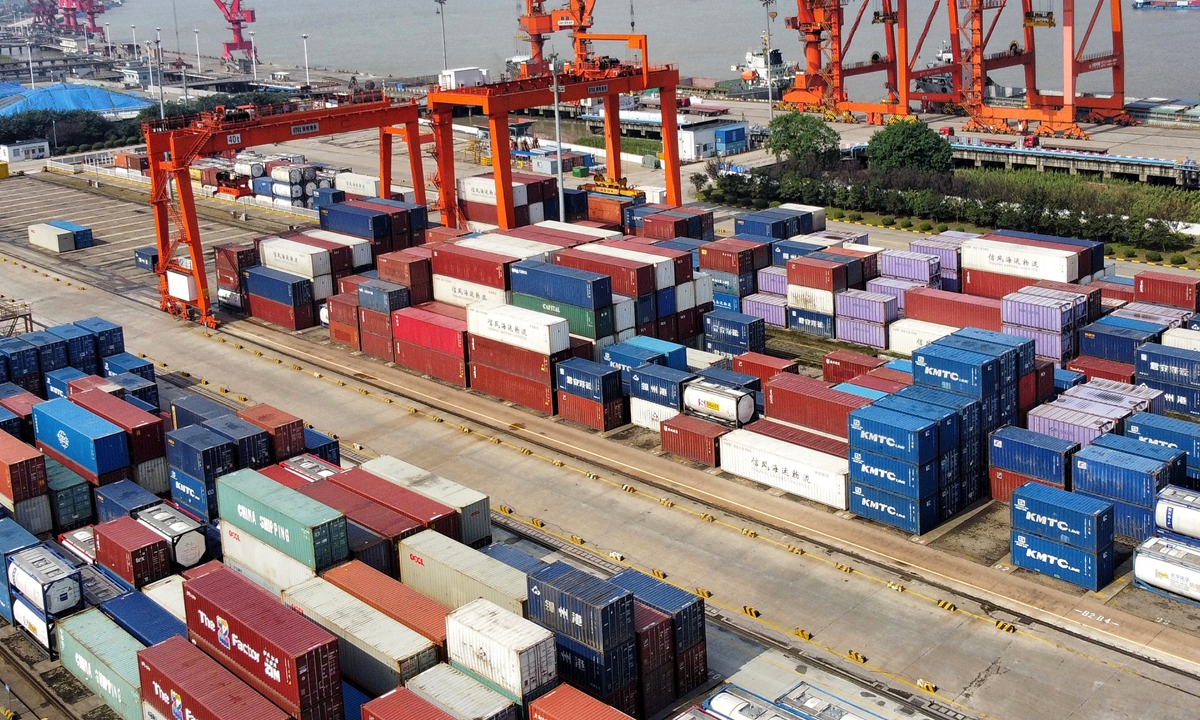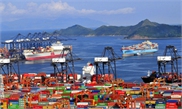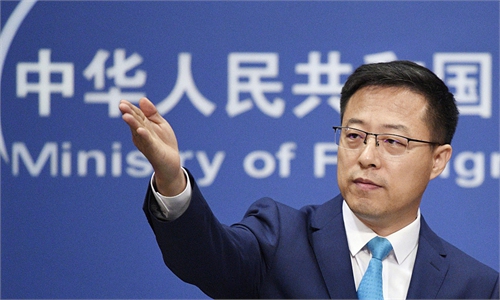China not blocking Lithuanian goods, but firms consider cutting ties amid rising anger
But firms consider cutting ties as calls for punishment rise

A view of the Zhangjiakou port in East China's Jiangsu Province on October 21. Photo: cnsphoto
Chinese customs and industry insiders on Monday refuted some EU officials' claims that Chinese customs are not clearing products from Lithuania or those from EU countries that contain Lithuanian components, urging EU officials to stop hyping claims of "economic coercion."
But the insiders also expressed worries about products coming from Lithuania, as domestic anger over the Baltic country has been rising after its repeated trampling on the one-China principle. Some Chinese firms are avoiding Lithuanian products due to growing business risks.
Observers also warned that instead of hyping claims of "economic coercion" against Lithuania, the EU should negotiate with China through normal channels, and that it must also understand that if someone's trying to harm China's core interests, there would be a price to pay.
A customs source in Qingdao, East China's Shandong Province, a major port, said on Monday that there has been no official document received yet that shows goods from Lithuania or from other countries but with Lithuanian components are banned from being imported.
The source also noted that no documents about banning Lithuanian items have ever been published. "The latest documents related to international trade can be viewed on the official website of [the customs administration]," the source said.
Earlier, Valdis Dombrovskis, EU executive vice-president for trade, said in an interview with Germany's daily newspaper Die Welt that China's customs have not cleared products from EU countries that use Lithuanian parts and components, and the situation has worsened.
Dombrovskis added that the EU will work hard to find a solution acceptable to both parties, and is collecting evidence and, if necessary, it will sue at the WTO.
China's Foreign Ministry has slammed the "irresponsible remarks" by the EU official, saying that suggestions that Chinese customs are not clearing products from EU countries that use Lithuanian parts and components are not true.
Some media organizations have hyped claims of China removing Lithuania from the customs declaration system, suspending Lithuania's import trade licenses, and exerting pressure on multinational companies, but such reports are not true, Foreign Ministry spokesperson Zhao Lijian said on December 24.
If certain products encounter technical problems when being exported to China, relevant companies should report it to the Chinese authorities through normal channels, and the relevant European parties should respect the facts and stop making irresponsible remarks, Zhao noted.
Although there have been no official measures, more Chinese traders are choosing to stop selling or remove Lithuanian products voluntarily to prevent potential risks, amid deteriorating bilateral ties and rising calls to ban Lithuanian products.
A Chinese importer trading Lithuanian spirits at an e-commerce platform told the Global Times that they removed the products from the website after relations between the two countries deteriorated.
"Lithuanian spirits don't sell well in the Chinese market. Rum, for example, sells for only dozens of yuan a bottle, yet few buy it," he said.
Chinese netizens have also been calling for severe punishment on Lithuania for its provocation over the Taiwan question.
Analysts also sounded the alarm over the unaffordable fallout on Lithuania's economy, if the country does not correct its mistakes soon.
"The emotions of netizens are understandable, but we need to do it technically. China is still opposed to unilateral sanctions," Cui Hongjian, director of the Department of European Studies at the China Institute of International Studies, told the Global Times on Monday.
Cui said that the EU may not want to intensify the contradiction, as it has proposed to treat the problem as an economic and trade issue and sought to solve it within the WTO framework. However, by doing so, the EU has avoided the core of the problem: Lithuania challenged the one-China principle.
Chinese officials have warned several times that what Lithuania has done severely damaged the political foundation of diplomatic relations between the two countries, and also hurt the atmosphere for the two sides to develop pragmatic and mutually beneficial cooperation.
"Lithuania has difficulties in its economic and trade cooperation with China, and it must find reasons in itself," Zhao, the spokesperson, said.
Lithuania's economic reliance on China has been on the rise in recent years, with its China-bound exports ranging from farm produce and beer to lasers.
Overall trade between China and Lithuania rose from $1.35 billion in 2015 to $2.14 billion in 2019, up 82 percent, according to a report by Forward Intelligence earlier this year.
China's trade with Lithuania grew 7.6 percent year-on-year to reach $2.29 billion in 2020, while Lithuania's exports fell 3.4 percent and its imports shrank 9.3 percent, per Forward Intelligence.


